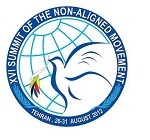As the host of the upcoming 16th Non-Aligned Movement (NAM) Summit in Tehran, Iran hopes to reduce the punitive isolation imposed on it by the U.S. and NATO in reaction to its controversial nuclear program. Prime Minister Manmohan Singh, who will travel to Tehran on August 29th, 2012, is among the 100 state representatives that are expected to attend the Summit. Dr. Singh’s presence at the summit – to be followed by a bilateral meeting – coupled with India’s continued purchase of Iranian crude are both important factors for Iran. Hence, Iran’s Foreign Minister, Ali Akbar Salehi, visited India in June and extended an invitation to India for the NAM Tehran Summit.
India played a key role in the formation of NAM in 1961. The grouping was formed as a loose association of nations opposed to Cold War polarities; a third force between the two rival Communist and Western blocs. Even though the U.S.-Soviet Union Cold War ended with the dissolution of the Soviet Union, a new sense of bitterness has evolved between the two camps of the U.S. and NATO countries versus Russia and China. Unlike the proxy wars of the Cold War in Africa, the current Arab nations undergoing upheavals in West Asia-North Africa (WANA) have key implications for world affairs. Almost all the affected countries are members of NAM. To this end, NAM can play a role in reducing the violence and tempering regional and global rivalries in the reordering of WANA.
The high decibel agitation of the U.S. against the upcoming Summit and its attempts to prevent the United Nations Secretary-General, Ban Ki-moon, from making his traditional appearance at the Summit, is noteworthy. It reflects an indirect acknowledgment of the role that a revitalized NAM can play in reducing the isolation of Iran and providing a forum in which the regional antagonists can interact with one another.
Given the evident inability of the United Nations Security Council (UNSC) to effectively respond to the shifting realities of the region, and the international order at large, a need for other international and regional associations to step in is self-evident. Unfortunately, the Arab League has, as before, played the tune called by the Saudi pipe. Unlike the Arab League, the Organization for Islamic Cooperation (OIC) that was dominated by Saudi Arabia and has been largely ineffective in the past, managed to provide an opportunity for public posturing and a new regional dialogue. At the OIC Summit in Mecca in August, regional rivals such as Iran, Turkey and Saudi Arabia were brought together to discuss the imperatives of their own continued coexistence rather than to serve the interests of outside powers. Similarly, the upcoming NAM Summit in Tehran will be an opportunity for a continued discourse among NAM members aimed at tempering their differences, even as their rivalries play out in Syria.
Early signs of momentous changes in regional dynamics can already be discerned. Egypt, with its eighty-million population, will be a key player. It has already reached out to Iran by allowing Iranian naval ships to enter the Mediterranean via the Suez Canal after almost thirty years of hostility. Additionally, the presence of Egypt’s President Morsi at the NAM Summit to hand over the chairmanship marks a start towards normal diplomatic relations. What may, however, disturb the U.S. is the more independent policy that Egypt could evolve on the Palestinian question. The issue has been re-opened by recent military activity in the Sinai Peninsula and also by the pressure being exerted by the U.S. to maintain the terms of the 1979 Camp David Peace Treaty with Israel. However, the elected Muslim Brotherhood Government cannot for long be indifferent to the strength of the sentiments of Egyptian people on these issues. It is only a matter of time before the existing treaty relations of Egypt with Israel will need to be revised.
The fallout of the Syrian crisis can either heighten instability in the region or turn into an opportunity to create a more collaborative dynamic. The NAM Summit in Tehran is an opportune occasion for member states to revitalize the role of this movement and to utilize the meeting to discuss the future of the WANA region and beyond. In all of this, as a key founding member of NAM, India can play a leading role in bringing about a dialogue as we pursue our own interests in stabilizing the region.
Neelam Deo is India’s former ambassador to Denmark and Ivory Coast, and served in Washington and New York. She is the director and co-founder of Gateway House: Indian Council on Global Relations.
Azadeh Pourzand is a Senior Researcher at Gateway House: Indian Council on Global Relations.
This article was exclusively written for Gateway House: Indian Council on Global Relations. You can read more exclusive content here.
For interview requests with the author, or for permission to republish, please contact outreach@gatewayhouse.in.
© Copyright 2012 Gateway House: Indian Council on Global Relations. All rights reserved. Any unauthorized copying or reproduction is strictly prohibited.
Sources
(2) White, Joseph Robert, “Non-Alignment Movement” in Ed. Arnold, James R. & Weiner, Roberta, Cold War: The Essential Reference Guide, ABC-CLIO, Santa Barbara, USA, 2012, P 153-155
(3) http://thedailynewsegypt.com/2012/08/11/rafah-crossing-closed-again/
(5) http://www.reuters.com/article/2012/02/17/us-egypt-iran-suez-idUSTRE81G1N520120217
To read Foreign Secretary Ranjan Mathai’s statement on Prime Minister Manmohan Singh’s visit to Iran, click here.


